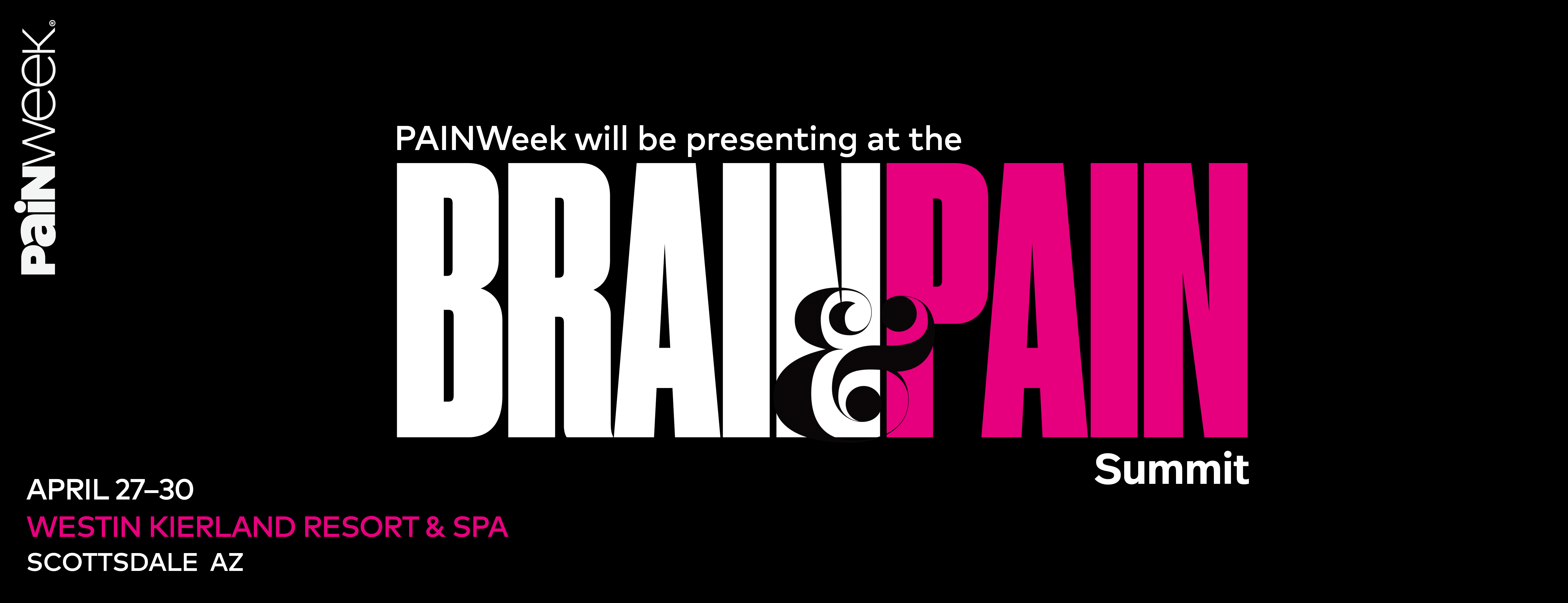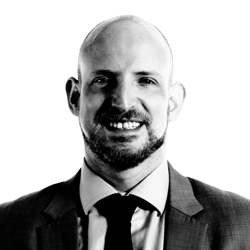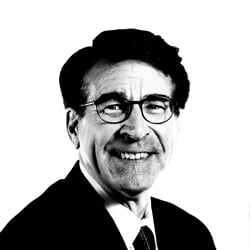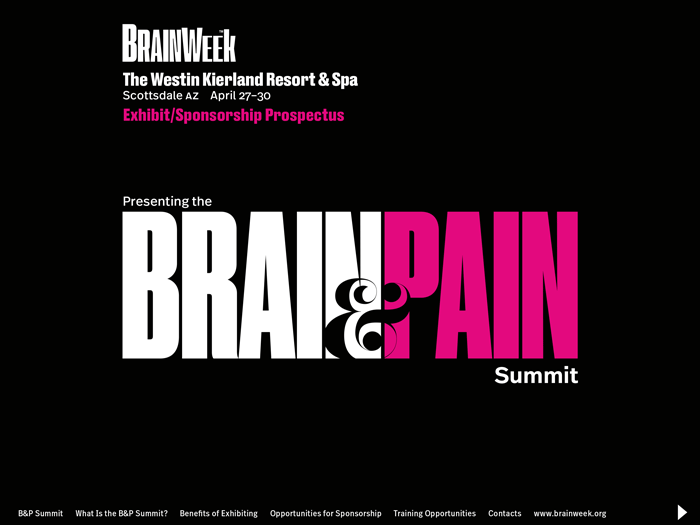
This 4 day meeting will be a mix of CNS and pain management CME/CE
BRAIN & PAIN Summit 2023
April 27-30
This conference will provide 15+ CE/CME credits hours
Register today for only $299!
Westin Kierland Resort & Spa
6902 E Greenway Pkwy
Scottsdale, AZ 85254

PROGRAM INFORMATION
The BRAIN & PAIN Summit 2023 will convene April 27-30 at the prestigious Westin Kierland Resort & Spa in Scottsdale, Arizona. The agenda has been developed to address the most frequently treated CNS conditions seen by specialists and frontline clinicians. The 4-day conference will present 15+ CME/CE credit hours. Book the package! It includes Summit registration, 3 nights at the Kierland, taxes and resort fees. You’ll save $100 by booking everything together now!
FACULTY
Faculty subject to change
Alon Avidan
MD, MPH
Director, UCLA Sleep Disorders Center
David Spencer
MD
Professor of Neurology
Eugene Vortsman
DO
Clinical Director of Addiction Medicine and Disease Management
Fiona Barwick
PhD, DBSM
Clinical Associate Professor
Gregory M. Pontone
MD
Neuropsychiatry, Associate Professor
Jay Salpekar
MD, FANPA, FAES, DFAACAP
Associate Professor of Psychiatry and Neurology
Kiran Patel
MD
Interventional Pain Medicine Specialist
Merle Diamond
MD
President, Medical Director
Michael R. Clark
MD, MPH, MBA
Professor of Psychiatry and Behavioral Sciences
Ramon Cuevas-Trisan
MD
Associate Chief of Staff for Education & Research
Sarah Kelley
MD
Director, Pediatric Epilepsy Monitoring Unit
COURSE AGENDA
Faculty and courses are subject to change. The online schedule below has the most up to date information.
1:00p — Registration
1:30p — Welcome Hour/Snacks/Drinks
2:30p —Diamond Headache Clinic: Epidemiology and Diagnosis
Migraine is a complex disorder of the nervous system that is recurrent and causes significant disability. In fact, it is the second most common cause of disability worldwide. Migraine attacks can occur unpredictably and are a major cause of missed time from work and other activities. The impact of migraine is staggering, affecting about 40 million Americans. Women have a significantly increased risk, and almost 1 in 5 are affected. Because migraine is often genetically transmitted, families may be impacted. This course will look at current diagnosis and secondary headache causes, cover what migraine is, and look at the common evolution of a migraine attack. Also to be discussed: the current classifications of migraine and what they mean in terms of disability and treatment, and the evolution of the understanding of migraine pathology and how it has introduced newer interventions for this patient population. Older theories will be covered, as well as what is understood today and the importance of CGRP, the risk factors for chronification of migraine, and how to take a headache history.
Faculty: Merle Diamond, MD
3:30p — Shadows and Light: How Grief Rewires the Brain
Bereavement is the state of being deprived of something or someone, resulting in grief, an emotion which can draw one toward the something or someone missing. While the experience of social loss is universal, each person’s individual grief is unique, and the path to returning to a life of satisfaction requires arduous work. This course will review the characteristics of grief, describe empirical studies validating models of grief, and define the construct of Prolonged Grief Disorder—newly listed in the Diagnostic and Statistical Manual of Mental Disorders, the American Psychiatric Association's handbook for mental health disorders. In addition, a summary of treatment trials for complicated grief, along with a framework for grief work, will be provided.
Faculty: Michael R. Clark, MD
4:30p — Diamond Headache Clinic: Prevention & Treatment
Migraineurs need preventive treatment and learners will find out who and why as pharmacological treatments are discussed, along with neuromodulating devices, supplements, and lifestyle interventions. Migraine treatment has evolved dramatically in the past 5 years and, because of this, migraine patients have experienced better outcomes with fewer side effects. It is important to look at what prevention outcome goals are and how to can track them. Even though older treatments were fraught with tolerability issues and patient compliance, it is important to understand them. Older therapeutic agents, clinical data, and how to utilize the information will be addressed. The rating system for migraine prevention medicines, formulated by scientific data, will be explored. In the past several years there have been changes to preventative migraine treatments, including botulinum toxin for chronic migraine and the advent of monoclonal antibodies to CGRP and GPANTS.
Faculty: Merle Diamond, MD
5:30p — Break/Exhibits
5:45p — Through the Looking Glass: Translating Psychedelic Research Into Clinical Paradigms
Embark on a journey to uncover the cultural, scientific, and political history of psychedelics. This course will delve into their early use by indigenous natives to the modern resurgence in use among scholars. What are the basic mechanisms behind the profound effects of these substances on the human brain and psyche? It’s important to understand as much as possible as psychedelic medicine continues to gain mainstream acceptance. History is being made! Join us on this exciting expedition as we explore the new frontier of psychedelic medicine and its potential to transform our understanding of mental health and wellbeing.
Faculty: Eugene Vortsman, DO
7:30a — Registration
8:00a — Breakfast (Provided by the BRAINWeek 2023 National Conference in Las Vegas)
8:30a — Diamond Headache Clinic: Acute Treatment
This portion of the Migraine Track will dive into acute treatment options for patients struggling with migraine attacks. The course will review traditional tools and their most appropriate application for acute migraine attack management, and explore newer options for treatment, including oral, injectable, infused, and even nonpharmacologic tools available for patients in need of care. After reviewing efficacy and tolerability data, literature surrounding patient preference, and organizational position statements in headache treatment, best practices will be explored, including how to avoid common missteps that can lead to unintended consequences—medication overuse headaches, poor therapeutic outcomes, and even dependence issues with medications. The session will offer actionable choices a prescriber can utilize to best drive the strongest possible patient focused clinical outcomes when treating acute migraine attacks.
Faculty: Merle Diamond, MD
9:30a — Break & Exhibits
10:00a — Narcolepsy: What Lies Beneath
Narcolepsy is a chronic neurological condition characterized by pervasive, excessive daytime sleepiness, as well as the abnormal intrusion of rapid eye movement sleep into wakefulness. Narcolepsy type I, or hypocretin deficiency syndrome, also includes cataplexy, where there is a sudden loss of skeletal muscle tone during wakefulness, and is often triggered by a strong emotion, such as laughter, surprise, or anger. Other symptoms of narcolepsy include fragmented or disturbed nighttime sleep, sleep paralysis, and hallucinations, either when falling asleep (hypnagogic) or when waking up (hypnopompic). The evaluation of people with suspected narcolepsy requires meticulous clinical history taking, validating the patient’s sleep duration and regularity, and assessment of patients for conditions that could also present with hypersomnia such as insufficient sleep and delayed sleep phase disorder, depression, and obstructive sleep apnea. Management of people for narcolepsy includes lifestyle modification, short and strategic shift power naps, as well as a variety of pharmacologic agents to improve daytime sleepiness, episodes of cataplexy, and sleep fragmentation at night. The lecture will review all aspects of narcolepsy, defining its unique features, differential diagnosis, and strategies for evaluation, management, and patient advocacy.
Faculty: Alon Y. Avidan, MD, MPH
11:00a — Matilda's World: Sensible Pharmacology for Autism Spectrum Disorders
As the mental health conditions that are associated with developmental disabilities become better identified, clinicians are often challenged by how to diagnose and aptly treat these conditions. Symptoms presentations may vary in the context of autism spectrum disorders. Additionally, the evidence base for treatment, both pharmacologic and non-pharmacologic is not as well developed for those with developmental disabilities. This session will discuss theoretical underpinnings for co-occurring conditions and also outline a treatment approach that may allow integration with non-pharmacologic strategies. Psychopharmacologic approaches will be discussed in depth, as well as assessment strategies that may account for atypical symptom presentations of psychiatric conditions. The evidence base for pharmacologic treatments will be reviewed and practical strategies for management will be emphasized.
Faculty: Jay Salpekar, MD
12:00p — Break & Exhibits
12:30p — Lunch (Provided by the PAINWeek 2023 National Conference in Las Vegas)
1:15p — Things That Go Bump in the Night
Complex nocturnal behaviors are some of the most fascinating sleep disorders in medical practice and often include a variety of conditions that require detective work. Parasomnias can include both simple and complex abnormal behaviors and are defined as abnormal sensory or behavioral phenomena that manifest during sleep-wake transition. Parasomnias are divided into those that occur during rapid eye movement (REM) sleep (including nightmares, isolated sleep paralysis, and REM sleep behavior disorder or RBD) and those occurring during nonrapid eye movement (NREM) sleep (such as sleepwalking, sleep terrors, and confusion on arousal. RBD often precedes the onset of neurodegenerative conditions, particularly α-synucleinopathies, a group of neurodegenerative diseases characterized by abnormal accumulation of insoluble α-synuclein in neurons and glial cells, comprising Parkinson’s disease, dementia with Lewy bodies, and multiple system atrophy. Other forms of complex behaviors include motor behaviors of sleep, such as rhythmic movements disorder, periodic leg moments of sleep, and bruxism. Sleep related epilepsy may resemble parasomnias but tend to be monomorphic and stereotyped. The lecture will provide insight into the differential diagnosis using video examples covering the unique features of the key parasomnias, their unique features, and management strategies.
Faculty: Alon Y. Avidan, MD, MPH
2:15p — Turning a New Leaf: Examining Cannabinoids for Epilepsy Treatment
Cannabinoids are varied in terms of products available and have multiple roles in the central nervous system. During this session, an updated overview of the endocannabinoid system and potential targets of therapeutic agents will be provided. Epilepsy is a common illness that has proven to improve with use of cannabinoids. Treatment approaches are challenging given the lack of available data and the uncertain quality of products. However, the therapeutic potential of these agents for epilepsy and in other conditions is vast and will be explored during this section.
Faculty: Jay Salpekar, MD
3:15p — Break & Exhibits
3:30p — Sleep as an Intervention for Neurological Conditions and Psychiatric Disorders
How can you help your patients sleep better, especially those who report poor sleep in the context of co-occurring neurological and psychiatric conditions? This session offers evidence based recommendations for improving your patients’ sleep, along with biological reasons to help motivate patients to actually implement the strategies suggested. After this session, attendees will be able to assess how cognitive behavioral therapy for insomnia (CBT-I) fits into the larger category of behavioral sleep medicine (BSM). Also be discussed: the role circadian biology, sleep drive, and stress response play in sleep, and specific sleep and circadian targets for improving sleep in the context of co-occurring neurological conditions and psychiatric disorders.
Faculty: Fiona Barwick, PhD
4:30p — Welcome Reception
8:00a — Breakfast (Provided by the PAINWeek 2023 National Conference in Las Vegas)
8:30a — The Devil is in the Details: Addressing Parkinson's Disease Psychosis
The spectrum of psychotic symptoms in Parkinson’s disease may can include disordered thinking, hallucinations—auditory, visual, olfactory, gustatory, tactile—delusions, and/or agitation. According to estimates from the Parkinson’s Foundation Prevalence Project, 1.2 million people in the United States will be living with PD by the year 2030. This course will provide a summary of symptoms, along with strategies for efficient differential diagnosis and detection. Best-evidence treatment strategies will be outlined and discussed.
Faculty: Gregory Pontone, MD
9:30a — Break & Exhibits
10:00a — Shuffling the Deck: Seizure Rescue Therapies
Acute repetitive seizures (cluster seizures) and prolonged seizures are common in both childhood and adult epilepsy, and can be life threatening. This session will identify those is at greatest risk for prolonged or repetitive seizures and review updates on treatment options. That information will be applied to cases, and practical rescue plans for patients will be discussed.
Faculty: David Spencer, MD
11:00a — Joint Custody-Minding Osteoarthritis
Osteoarthritis (OA) pain complaints are among the most common encountered by a clinician in an ambulatory care practice. Many clinicians, however, lack up-to-date knowledge about proper staged management of this condition. This course will cover concepts of evaluation, including appropriate and directed history and basic exam and imaging findings that should be appraised when patients present with joint pain. We will discuss proven and unproven commonly accepted management methods for pain in OA and review the medical literature related to various therapies, both conservative and interventional, for its management. Also to be reviewed: evidence and indications for newer OA pain management therapies including regenerative injection therapy approaches.
Faculty: Ramon Cuevas-Trisan, MD
12:00p — Lunch (Provided by the BRAINWeek 2023 National Conference in Las Vegas)
12:45p — Break & Exhibits
1:15p — Off and On: Evaluating On-Demand Therapies for Parkinson’s Disease
Parkinson's disease is diagnosed in about 60,000 Americans each year; over 10 million people worldwide live with it. This session will describe the most common motor complications in Parkinson’s disease. Factors that contribute to the emergence of on-off fluctuations will be reviewed, along with potential therapies.
Faculty: Fiona Barwick, PhD
2:15p — Where Is the Sandman? Addressing Sleep & Chronic Pain
Faculty: Fiona Barwick, PhD
3:15p — Break & Exhibits
3:30p — All That Jazz: Neurostimulation for Epilepsy
Epilepsy is a common neurologic disorder that can greatly affect a person’s health and well-being. While many patients can be successfully treated with medication, about a third of patients with epilepsy become refractory to medical treatment. When this happens, the next step is to consider nonmedication options. This course will look at diagnosis and treatment of patients with epilepsy with a special focus on next steps in the evaluation and management of patients with refractory epilepsy and the use of devices and neurostimulation in this population.
Faculty: Sarah Kelley, MD
8:00a — Sponsored Breakfast - Taking a Targeted Approach to Treating Opioid-Induced Constipation
9:00a — Breakfast of Champions: Ketamine Infusion for Chronic Pain and Depression
Ketamine was developed in 1962 as a less hallucinogenic and shorter acting anesthetic agent than phencyclidine. It was first used in humans in 1964. Since then, ketamine has been used for a variety of purposes, including the management of acute pain, chronic pain, and depression. The history of ketamine will be examined, and the current evidence available supporting its use in chronic pain and depression will be presented.
Faculty: Kiran Patel, MD
10:00a — Break & Exhibits
10:15a — Walking on Spikes or Clouds?: DPNP Analgesics
Pain associated with diabetic peripheral neuropathy can be disabling and difficult to manage. Reported pain is on the rise. Avoidance—by preventing/delaying the onset of diabetes—whenever possible, is critical. Proven effective treatments only help some patients with the condition. Management recommendations have evolved over the last 10 years based on newer agents and more medical evidence showing efficacy of some agents and lack of efficacy of others, challenging traditional paradigms. Medical evidence will be presented for various pharmacotherapy options, exercise, and minimally invasive treatment options. The practical selection of management methods depends on various factors including other medical conditions, cost, and experience of the patient’s provider.
Faculty: Ramon Cuevas-Trisan, MD
11:15a — Adjourn
**In addition to registration to the 4 day BRAIN & PAIN Summit, the hotel package includes a 3 night stay at the Westin Kierland Resort & Spa.
In order to maintain the clinical nature of the conference, nonclinicians—including, but not limited to, office managers, billing specialists, receptionists, and administrative staff; guests, spouses, friends, and/or family members—may not attend sponsored meal programs and the scientific sessions.
VENUE
Westin Kierland Resort & Spa
6902 E Greenway Pkwy
Scottsdale, AZ 85254
Phone Number: (480) 624-1000
This 4 star hotel is a serene oasis in the Sonoran Desert and is near dining and shopping at Kierland Commons. After all that learning, treat yourself to the golf club and an award-winning course designed by local architect Scott Miller. Plan to bring the kids? The OdySea Aquarium is nearby. Need a break from everything? Why not have a facial, massage, mani/pedi at Agave, The Arizona Spa & Salon. With Heavenly® Beds, high-speed internet access, complimentary bottled water, a coffee maker, a work desk, and flat screen TV to stream a movie, you can have it all!

SPONSORED PROGRAMS
To accompany and enrich your experience at the BRAIN & PAIN Summit, be sure to attend one or more of the sponsored programs, which are scheduled during breakfast, lunch, and afternoon time slots.
SPONSORS & EXHIBITORS
Available soon.
EXHIBITORS AND SPONSORS
Looking for Sponsorship Opportunities?
Click below to download the Exhibit/Sponsorship Prospectus.
Accreditation

BRAIN & PAIN Summit
This activity is provided by Global Education Group.
Complete accreditation language will be available soon.






.png?width=250&height=241&name=Patel%20(2).png)






